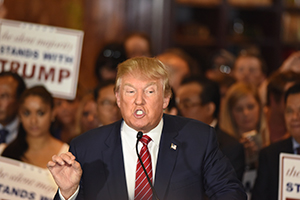The Trumpification of the US media: why chasing news values distorts politics
Posted by, Stephen Cushion

Outside the US, the prospect of Donald Trump being elected president is typically met with a mixture of amusement and alarm.
After all, how can a billionaire reality TV star become the most powerful leader in the world when he proposes building a giant wall to prevent Mexican immigrants coming to the US and banning all Muslims from entering the country?
But having been a visiting scholar at the University of Texas at Austin for the last two weeks, I’ve spent far too much of my time watching television news coverage of the election campaign. Once you switch on it’s hard to avoid seeing or hearing Trump, listening to what other candidates think about Trump, or being exposed to policy issues that aren’t viewed through the prism of Trump’s politics. In fact, flicking between any one of the news channels there’s little on offer besides election coverage – with Trump as the lead protagonist.
True, we’re in the thick of the primary season, so perhaps a heightened emphasis on horse-race journalism is only to be expected. But my impressionistic observation of Trump’s dominance holds true for far longer than a fortnight.
As reported in The Economist, between the beginning of 2015 and 26 February 2016, Trump received over 400 minutes of airtime on the ABC, NBC and CBS evening newscasts, compared to less than 100 minutes for both his main Republican opponents, Ted Cruz and Marco Rubio. Hillary Clinton and Bernie Sanders combined received less than half the coverage Trump did.
Since Trump is the clear frontrunner in the Republican race it is only right – journalists may argue – that he dominates the coverage and sets the agenda. But it is arguably a reliance on news values to determine campaign agendas that perpetuates the Trumpification of election reporting.
Out of control
In the UK, by contrast, broadcasters have to abide by strict “due impartiality” requirements in coverage of politics. Although sometimes misinterpreted, this does not result in major parties and candidates receiving equal airtime because the “due” allows for journalistic discretion. But, at the very least, it promotes a greater editorial sensitivity in exercising journalistic judgements about achieving “balance” and maintaining public confidence in the impartiality of broadcasters.

EPA/Erik S. Lesser
Since US broadcasters are not subject to such regulatory obligations, commercial news values can supersede (or trump!) any imperative to police the impartiality of how leaders and parties are reported. And that distorts coverage in favour of politicians who have mastered the art of what Frank Esser has called “self-mediatization”: the ability to set the media agenda by appealing to the news values of mainstream journalists.
This is perhaps Trump’s most successful campaigning strategy. From provocative speeches in campaign rallies to cheap personal attacks on his opponents during television debates, the Trumpification of politics is a perfect fit for the commercial goals of US broadcasters. In a recent Fox News television debate for Republican primary candidates, almost 17m viewers tuned in – the highest ratings received for any of the primary debates – but rather than exploring the policy positions of the remaining four candidates, most of the questions were either directed at Trump or revolved around him.
Many Republican voters seem to be selecting a businessman rather than a Washington insider as their preferred candidate. There is a genuinely huge story here: just as Democratic insurgent Bernie Sanders is relying on donations from citizens rather than big businesses, Trump’s ability to self-fund and defy the party establishment is a fundamental challenge to the way US election campaigns are typically funded and directed. But while this might represent a refreshing change from previous election cycles, the media attention it’s devouring comes at the expense of actually discussing what’s really at stake.
Post-truth
Of course, the spectacle of candidates evading policy issues or misleading voters is nothing new to contemporary politics. The 2012 US election was characterised as heralding an era of post-truth politics. But when a candidate such as Trump emerges, this so-called era of post-truth politics becomes an altogether more dangerous proposition than anything we’ve seen in recent years.
Clearly Trump’s angry rhetoric connects with many people’s anxieties about immigration and national security, but the impractical solutions he proposes need to be more thoroughly questioned, probed and challenged by journalists, rather than implicitly accepted and legitimised.
The politics of reactionary populist fear is hardly unique to the US. Many of Europe’s democracies have lurched dramatically to the right as the continent’s refugee crisis deepens – most recently Slovakia, where an openly neo-Nazi party now sits in parliament.
But where the US differs from most other advanced Western democracies is in the formal rules policing broadcast news coverage, which for many American voters is still their principal source of information about the election. The American approach to election reporting is shaped almost entirely by the pursuit of commercial news values, rather than a journalistic attempt to balance party perspectives and the views of competing candidates.
This doesn’t mean the media is single-handedly responsible for the Trump phenomenon, which has emerged at a fraught time in an always-complicated political culture. But the US’s dominant media system has had little impact on diminishing the opportunity for a politician with such contempt for policy to emerge as a credible Presidential candidate.
Relying on news values alone might sound like a reasonable and professional strategy for choosing election stories in a competitive industry, but it’s far from politically neutral. Editorial priorities can help directly shape campaign agendas and delimit the range of issues that get discussed and debated. No-one wants an over-regulated or stifled broadcast media, but whatever one’s political persuasion, surely exercising some degree of balance in election coverage can only be good for safeguarding democratic debate – whether in the US or elsewhere.
This article was originally published on The Conversation. Read the original article.
